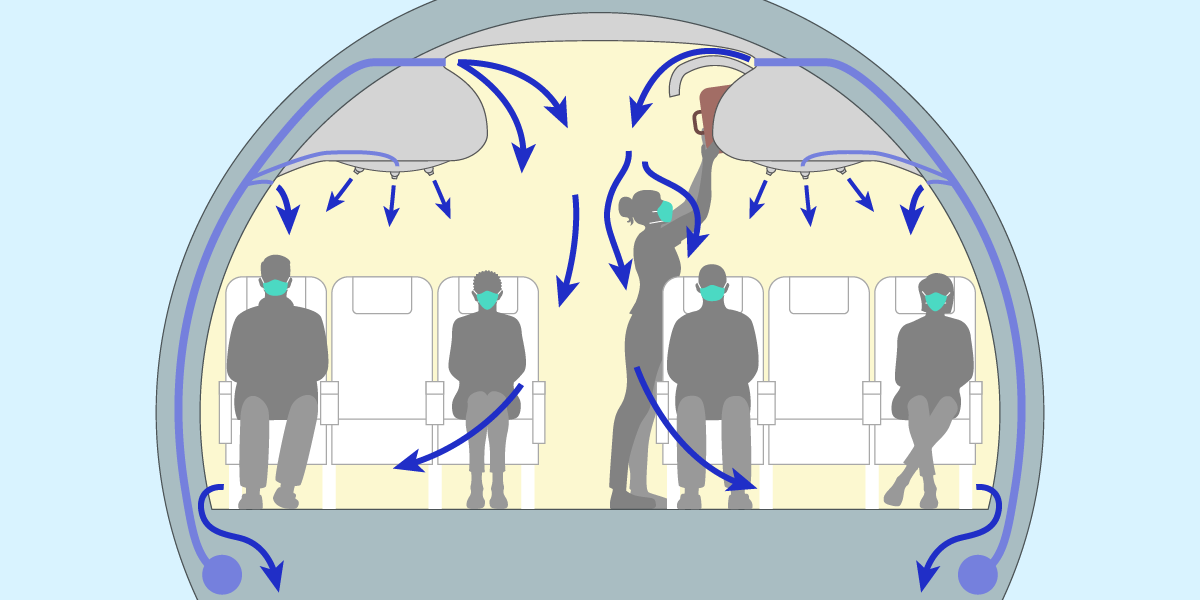How Safe Is Air Travel During Covid
MIT Medical answers your COVID-nineteen questions. Got a question almost COVID-xix? Send it to us at CovidQ@mit.edu, and we'll do our all-time to provide an answer.
I'thousand anxious to visit my parents, but I'm wondering how safe it is to fly right now. With all the talk about the virus being airborne, how dangerous is the re-circulated air in the motel? Is information technology worth booking with an airline that blocks heart seats? And are there other risks I'm not even considering?

At first idea, a narrow metal tube in which strangers are crammed together for hours might seem like a flying petri dish, especially during a pandemic. The reality is a scrap more nuanced. While there are risks associated with flying, information technology may be safer than you think.
For starters, the air quality on a commercial airliner is actually quite high, with the air book in the cabin being completely refreshed every two to four minutes. Air flows into the cabin vertically — it enters from overhead vents and is sent downward in a circular motion, exiting at flooring level. In one case air leaves the cabin, virtually half is dumped exterior, and the rest is sent through HEPA (high-efficiency particulate air) filters, like to those used in hospitals, before being mixed with fresh exterior air and inbound the cabin once again.
Of grade, passengers and crewmembers moving up and downwards the aisles can disrupt this airflow, altering the path of whatever airborne particles. And while the HEPA filters used in commercial aviation can filter out 99.97% of virus-sized particles, they can't capture every respiratory droplet or viral droplets earlier someone else inhales it.
Still, the design of air-handling systems on commercial aircraft makes it unlikely that you'll be breathing in air from anyone more than a few rows abroad. In fact, a 2018 study that examined the manual of droplet-mediated respiratory illnesses during transcontinental flights found that an infectious passenger with influenza or another droplet-transmitted respiratory infection was highly unlikely to infect passengers seated farther abroad than two seats on either side or one row in front or in back.
And that was without masks.
Your flight volition exist even safer if your airline requires all passengers and crewmembers to wear face coverings, which are designed to contain respiratory droplets before they tin be expelled into the air. There's real-world testify that masks on planes can make a departure. Early in the coronavirus pandemic, a human flew from Wuhan to Toronto with a dry out cough and subsequently tested positive for COVID-19. He wore a mask during the flying, and no other passengers were infected.
True social distancing on a plane is impossible, but, every bit you note, some airlines are currently leaving middle seats unsold, creating a bit more than infinite betwixt passengers. So is it worth trying to book your flight with ane of those carriers? Arnold Barnett, the George Eastman Professor of Management Science and a statistics professor at MIT's Sloan School of Management might respond "yes." In an as-yet unpublished analysis, Barnett, an expert in mathematical modeling who focuses on issues of health and rubber, concludes that there is "a measurable reduction in COVID-nineteen risk when middle seats on shipping are deliberately kept open."
Barnett used an average of the infection rates in New York and Texas in early on July to judge the probability that any given passenger on board would be infectious and causeless universal masking. Still, he did not consider the odds of passengers becoming infected during boarding, deplaning, or moving about the motel during flight; the possibility of transmission between rows; or how the odds might change with longer or shorter flights. While Barnett acknowledges these potential shortcomings and the "rudimentary" nature of his calculations, he estimates that blocking out the center seat on airplanes would reduce the likelihood of COVID-19 infection by nearly one-half.
However, as many have pointed out, leaving middle seats empty is not a viable, long-term business model for an industry with razor-thin profit margins. But some airlines that have resumed selling middle seats have also committed to informing travelers when their flights are reaching capacity, allowing them to rebook on less crowded flights without punishment. Airline policies are constantly changing, so be sure to double-bank check your airline's electric current stance before buying a ticket.
And whatever your airline's centre-seat policy may exist, when it comes to the gamble of contracting an illness in flying, a window seat may exist your safest bet. Having a wall on one side automatically reduces your number of close-proximity contacts. A window seat too protects yous from the inadvertent close contacts that can occur when other passengers are hoisting bags into overhead bins at the kickoff of a flight or crowding aisles to deplane after landing.
Even with advisable precautions, a relatively curt domestic flying yet carries moderate risks and should not be undertaken lightly. And, as the CDC notes, the risks don't begin and end with the flight itself. You should also consider the prevalence of the virus in your community and the community to which you're traveling, your own hazard of severe disease from COVID-19 or the risks to vulnerable members of your household, and quarantine requirements at your destination or when you return home. MIT Medical continues to recommend that you postpone nonessential travel at this time, but if you must travel, do your best to travel thoughtfully, safely, and with deliberate attention to your own safety and the safety of others.
This news story has not been updated since the date shown. Information contained in this story may be outdated. For current information about MIT Medical'south services, delight see relevant areas of the MIT Medical website.
Belum ada Komentar untuk "How Safe Is Air Travel During Covid"
Posting Komentar